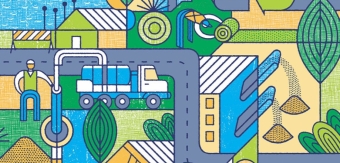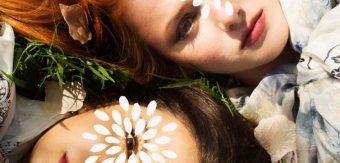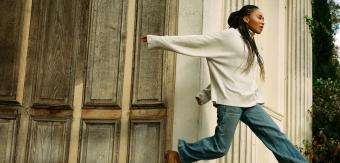Andrew Finan is a UK entrepreneur who has worked with games most of his life. In the nineties he ran a series of international chess events in the USA, Russia, Germany, France, the UK and Spain. They culminated in the World Chess Championship Final with Garry Kasparov at the top of the World Trade Center in New York in 1995. It was through chess he learned how games can be used to harness human intellect and ingenuity.
A published author, in 1998 Andrew wrote the critically acclaimed book 'Corporate Christ', taking a unique view of Jesus as a historical figure and how he marketed and communicated his message to the world. Now Andrew is concentrating his energies on KLOO a card game designed to teach players a new language.
Magnus Shaw: Where did the idea for KLOO come from?
Andrew Finan: I'm married to an Italian, and because we planned holidays to Italy every year, I wanted my two daughters to speak the language. So I invested in a range of products: CDs, DVDs, software, books, audio devices and lessons. But I was amazed and perplexed at how slow my girls were learning. Two things were clear. They did not enjoy learning Italian because it simply wasn't any fun. And the materials didn't seem to be at all effective anyway.
So I started to wonder if I could create a game that replicated the way we learned our first language, making learning more natural, more fun and easier. Playing with scraps of paper around the dining room table, I started to design and refine KLOO concept. The reaction of my daughters to KLOO shocked me. Within minutes my children were shouting out foreign sentences, laughing and were completely absorbed in the game. In fact, they were learning more in a single game of KLOO than in a month using other methods.
In 2009 I decided to develop KLOO so other people could benefit, working with an Oxford University linguist and native speakers, to develop the language content.
MS: Why the name 'KLOO'?
AF: We were looking for something memorable that also gave an insight into the way the cards worked. Originally it was called Clue Cards which morphed into Klu Cards. Then someone mentioned Klu was associated with the Klu Klux Klan so we shifted (rather swiftly) to KLOO Cards. But then we saw the innate strength of KLOO on its own. Short, powerful, memorable and also an anagram of 'LOOK'. KLOO has been registered as a trademark across Europe
MS: What's wrong with the traditional methods of language learning?
AF: A lot of evidence demonstrates they just don't work for a host of reasons. The best way to learn is through 'Discovery Learning'. That is the natural way we learned our first language. 'Discovery Learning' involves discovering what you want to know, when you want to know it. Some scientists call this the 'Aha! Moment' or 'Eureka Moment'. This is how our brains are hot-wired to learn a language. Videos, CDs, TV, audio devices and booksdo not use 'Discovery Learning' and so the brain is less receptive.
And context is crucial. By putting words into context you give your new vocabulary meaning. Meaningfulness is a central way for getting words into your long-term memory. The best technique for learning words is to seek the meaning of a word (because you need to know it) and then use it in a sentence. Many schools give out vocabulary lists - this is still the worst way to learn and actually leads to "Systematic Forgetting" - a frightening thought.
Fun is also a hugely important factor but is often overlooked. Many people give up learning a language because it becomes a chore. 150,000 children dropped language as a subject last year because they found it too difficult. However if you enjoy it, you do it more. The more you do it, the more you learn. KLOO is definitely fun!
We learned our first language by talking with other people and all research shows this is the best way. Speaking with others will massively reduce your learning time. The person you are interacting with does not have to be fluent. A friend, parent or colleague who is willing to interact and learn with you will make a big difference.
MS: How would KLOO work in schools?
AF: KLOO is a great classroom tool as it can be used in a variety of ways to engage students. Just four language packs can occupy a class of 32 children! It can be used for demonstrations, revision and even homework. Many learners who struggle with language find learning with KLOO a lot easier and a lot more fun.
MS: So what inspired the packaging and branding?
AF: We wanted packaging that would shout on the shelf alongside other games and books. We focused on making the name work hard for us - in a belief that people's curiosity would work for us. So the word KLOO takes up more than 60% of the fascia. A simple strapline "Play the game. Speak the language" quickly informs the buyer of the proposition. The rest of the front was used to communicate either French or Spanish content with, for instance, the Arc de Triomphe, a 2 CV Citroen, a woman wearing a beret etc. The reverse explains the contents and who it is suited to.
We wanted it to be fun but credible and polished.
MS: How does the game work?
AF: Each language pack contains two decks of cards (128 in total) which are colour coded into nouns, verbs and adjectives. At the top and bottom of each card is an un-translated word with a phonetic pronunciation. If the colour-coded cards are placed in the right order, you will make a sentence. There is no need to know an adjective from a pronoun or know what a conjugation is. With KLOO, players can make grammatically correct sentences within one minute of playing.
While playing you discover the meanings of words. It is this powerful Discovery Learning element that embeds meanings in your long term memory.
MS: How does the game's cost compare with other methods?
AF: Classes will cost typically £20 for an hour. A book will cost the same. An audio programme will retail for about £100. A software programme like Rosetta Stone retails for for £479. KLOO retails for £12.99 and 8 people can be learning simultaneously.
MS: How will you be marketing the game?
AF: We're planning a big PR push and an extensive AdWords campaign across Google. We see word-of-mouth as the key to the game's success, so a free trial is already available. KLOO will be distributed on-line, through retail outlets and directly into educational organisations. We're also exhibiting at Earls Court during the Language Show in October.
MS: Is KLOO available now?
AF: It certainly is! You can find it at www.kloogame.com
Magnus Shaw - un copywriter and une blogger
www.magnusshaw.co.uk





